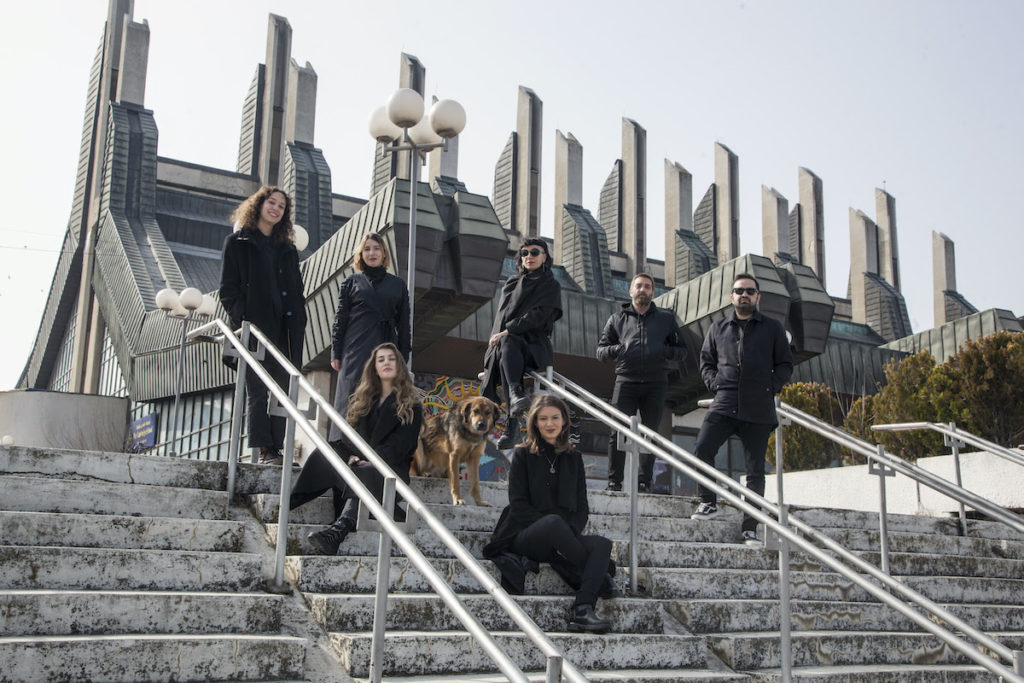
Manifesta 14 Prishtina Appoints Two Architectural Studios to Investigate the Fabric of Kosovo’s Capital and Its Communities
IBA Conversations: Brook Andrew
24 March 2021Istanbul Biennial Reveals the Curatorial Vision for Its 17th Edition
30 March 2021
Image: Manifesta 14 Prishtina local team © Qazim Gashi / Manifesta 14 Prishtina.
Manifesta 14 Prishtina
Autumn 2022
https://manifesta14.org
Life today seems to be increasingly unpredictable and the current media discourse shows an uncertain future threatened by polarisation, disintegration, climate chaos and rising economic inequality as well as the impact of the COVID-19 pandemic. These struggles for equality and new activist movements have motivated Manifesta to transform our way of working, by focussing on a more socially engaged and sustainable outcome of our biennial programme. This means that we work with urbanists, architects, ecologists and social designers next to artists and creative mediators to make sure we are able to transform Manifesta to a more diverse, democratic, bottom-up involvement of local voices and grass root communities, that turns signals into substance, and from there into concrete actions.
— Hedwig Fijen, Founding Director of Manifesta
Manifesta, the European Nomadic Biennial, originated in the early 1990s in response to the political, economic, and social change following the end of the Cold War and the subsequent steps towards European integration. Manifesta has developed into a platform for dialogue between art and society by inviting the cultural, artistic and urban community to produce new creative experiences with, and for, the context in which it takes place. Manifesta rethinks the relations between culture and society investigating and catalysing positive social change in Europe through contemporary culture in a continuous dialogue with the social sphere of a specific place.
The preparations for the 14th edition of Manifesta are in full swing in Kosovo. Despite the current restrictions due to the COVID-19 pandemic, the biennial has started to work as both a think tank and a local facilitator, to create alternative models for crucial urbanistic, social and cultural explorations in Europe’s youngest nation state. Throughout its 25-year history, the biennial has created an extensive research into the fabric of the local Host Cities in order to create sustainable and relevant interdisciplinary projects. This multifaceted bottom-up investigation takes the form of an urban vision, citizen consultations, the mapping out of local communities as well as an array of workshops with local opinion leaders in order to understand how the Host City might serve as a prototype for the world to come. Manifesta 14’s objective is therefore to produce sustainable projects with a longer-term legacy co-created with the local infrastructure in addition to contemporary art interventions across the city.
In line with this, a Jury chaired by the Mayor of Prishtina Sphend Ahmeti and Hedwig Fijen, director of Manifesta have selected the Turin based architectural office Carlo Ratti Associati in collaboration with MIT’s Senseable City Lab to conduct the urban vision for the City of Prishtina for the next edition of Manifesta. The urban vision functions as both a pre-biennial research and a long-term plan to identify possible strategies, sites, communities and key topics for the city. The urban vision informs how Manifesta 14 will take shape within the local context, but most importantly it is commissioned to develop how the city of Prishtina could be transformed by reclaiming public space by its citizens.
As the host of Manifesta, we as the Municipality of Prishtina are happy that we have already started to move forward for the best possible realisation of Manifesta 14 in our city, where in addition to choosing the wonderful team of local coordinators who have started to work for several months now, we have also selected the renowned Italian architect and activist, Carlo Ratti, to work on the realisation of the urban study for our city, with a special focus on the Brick Factory. The Municipality of Prishtina welcomes the ambitions of Manifesta 14 Prishtina towards the creation of a pilot model for a permanent interdisciplinary institution in our city, and we are happy to announce that we have assigned the ‘Hivzi Sylejmani’ Library for this purpose.
— Sphend Ahmeti, Mayor of Prishtina
Far from rendering cities obsolete, the Covid-19 pandemic has unlocked an ever-broader potential for renaissance – what the economist Joseph Schumpeter famously called “creative destruction” on an urban scale. The crisis left governments with little choice but to adopt a fast-paced, trial-and-error approach. The extraordinary innovations in pedestrianization, public space, affordable housing, and dynamic zoning that have emerged highlight the power of positive feedback loops with citizens. We are at the beginning of a new age of participatory urban innovation – which is at the core of what we are set to explore in Pristina with Manifesta 14.
— Carlo Ratti, director of the MIT Senseable City Lab in Boston and founder of design and innovation firm CRA-Carlo Ratti Associati
Coinciding with the urban vision executed by Carlo Ratti Associati and securing a bottom-up, radically local methodology, Manifesta decided, after the success of a similar democratic structure for Manifesta 13 Marseille, to develop citizen consultation workshops. Built together with various communities in Prishtina, these workshops will be led by Studio L A, co-founded by the Bosnian-Dutch architect and co-founder of Studio L A, Arna Mačkić and the Dutch architect Lorien Beijaert. These upcoming workshops are focused on the way culture(s) are understood and practiced by different artistic and citizens’ communities. In addition to this, the workshops will identify the agenda of Prishtina inhabitants in relation to the urban development, socio-cultural and educational policies of their city.
Dialogue is the foundation of an inclusive society. An equal, democratic society benefits from encounters between different people with different visions of the world. It is key that a diverse range of citizens interact, in a familiar environment, with each other in order to avoid that citizens are excluded within urban development projects. We believe that the design of a physical space has an influence on this. Designing and organising space for conversation is therefore part of our practice. We are honoured, especially due to our connection with the Balkans, to contribute to the development of the citizen consultation workshops in Prishtina together with Manifesta 14.
— Arna Mačkić and Lorien Beijaert, co-founders Studio L A
In the recent period of global health crisis and the current lockdown, it became crucial for Manifesta to rethink its basic principles and methodology by laying a distinct emphasis on more sustainable artistic practices, as well as to democratise the curatorial model of knowledge production, co-creation and linking different disciplines to long term projects, improvements of public space and community building.
In the first phase of Manifesta’s presence in Prishtina – delayed because the lockdown – Manifesta 14 Prishtina will open its temporarily based offices in the heart of Kosovo’s capital at the Palace of Youth and Sports, a monument of the former Yugoslav period. The Palace of Youth as an architectural object and as a cultural contribution of its time, occupies a special place in the collective memory of the citizens of Prishtina, influencing and shaping the cultural and social identity of the capital.
In addition to the Palace of Youth and Sports, the Municipality of Prishtina has assigned Manifesta 14 the building of the ‘Hivzi Sylejmani’ Library to be used as the future Manifesta 14 Prishtina headquarters and permanent institutional space. The building of the ‘Hivzi Sylejmani’ Library is a cultural heritage monument of the capital dating back from 1930, with the original function as a residential house. It was later transformed into a public library, where many generations fondly remember borrowing books.
In addition to the research projects, Manifesta 14 is working on a pre-biennial public programme with an array of cultural partners in Kosovo and the Balkan region to start at the Palace of Youth and Sports in Prishtina in the spring of 2021.
Manifesta’s biennial programme aims to open in the Autumn of 2022. The dates will be announced in the upcoming months.


